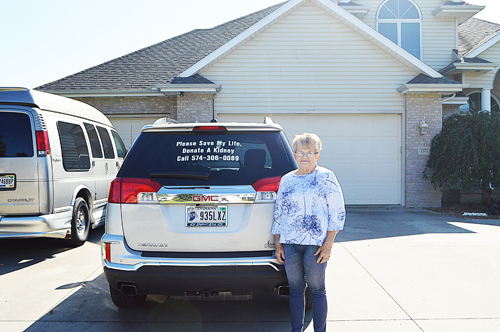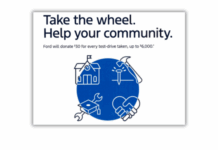
WINONA LAKE – According to the American Transplant Foundation, almost 114,000 people are on the waiting list for an organ transplant.
According to the Indiana Donor Network, of those 114,000, nearly 1,300 are Hoosiers. Janet Wagley, of Winona Lake, is one of those Hoosiers.
Janet has been a diabetic for 30 years. She said she was taking mega doses of several medications for too long and those damaged her kidneys. For the past 10 years, her kidney’s have gotten worse.
“Now, they’re just knocking at the door,” she said.
Janet is not on dialysis yet, but if her kidneys continue to get worse, she may have to be. She has already had two fistula put in – one on May 8 and the revision on Oct. 1, but both have failed. An arteriovenous fistula connects an artery and a vein. She said it isn’t that uncommon for the fistula to be redone.
Janet said she could get a graft – a type of looped tube – for dialysis if and when she gets to that point, but there are many issues with grafts, such as infections.
If Janet does end up going through dialysis, she will need treatment several times a week.
John Wagley, Janet’s husband, said dialysis patients are tethered to the treatment.
If a patient stops treatment, the prognosis is not good.
“In a few weeks, they’d be gone,” he said.
Janet has been on the Indiana organ transplant list for the past two months.
In order to get on the list, Janet has undergone numerous preparations, such as heart scans, EKGs and 27 viles of blood work.
“They want to make sure you’re otherwise healthy because there’s not enough kidneys to go around,” said John. “They don’t want to give one to someone who’s going to die from cancer in the next six months.”
However, there are some problems with that.
“The time a patient spends on the waiting list for an organ can vary from a few days to several years. The length of a patient’s wait is affected by several factors, including the urgency of his or her medical condition and the availability of donated organs. Tissue banks have a very limited supply of donated skin, bone, heart valves, tendons and corneas. All patients awaiting an organ or tissue transplant depend on the generosity of others,” according to the Indiana Donor Network website.
“If she doesn’t get a living donor, the odds are against her,” said John. John also said she is on the list for a cadaver, but it could take at least six years to get that.
“She won’t be around by then, statically,” John said.
John also said statics say, at Janet’s age, that if she doesn’t get a kidney within the next three years, chances are high she’s going to pass away.
According to the American Transplant Foundation, 20 people die every day from the lack of available organs for transplant and one deceased donor can save up to eight lives through organ donation and can save and enhance more than 100 lives through the lifesaving and healing gift of tissue donation and organ recipients are selected based primarily on medical need, location and compatibility.
John said two people die every day waiting for a kidney.
If Janet is able to get a kidney transplant, that procedure will be done at Indiana University Health.
According to Indiana University documents regarding living kidney donation patient education, there are four types of living donation – related, non-related, non-directed and paired donation.
Related donations are blood relative of transplant candidates, including parents, children over 18, cousins and siblings. Non-related donation are donors that are not related by blood, but may be close to the candidate, including spouses, close friends, coworkers and neighbors. Non-directed donations are donors that aren’t close or known to the candidate but made a decision to donate an organ or organs. A paired donation is an option for kidney recipients and “donors who are not compatible or are poorly matched can be matched with other recipients and donors. The recipients ‘trade’ donors to allow the transplants to occur.”
Janet said that is an option for her. She is O+, but if the person who wants to donate to her doesn’t have the same blood type and a kidney that is the right blood type is donated by someone else, the kidneys can be swapped.
As of yet, no one in her family has tested.
John said she has a very small family and Janet said they only have two adopted sons, so she doesn’t think they’d be a good fit.
According to the American Transplant Foundation, about 6,000 living donations occur each year and one in four donors are not biologically related to the recipient.
The kidney issues have brought about other health issues for Janet.
One of those health issues, John said, is vision problems.
She goes to the eye doctor every six weeks to get shots in her eyes for her diabetic retinopathy, Janet said. The shots are amazingly not painful. She actually expected it to be painful, but “it wasn’t that bad.”
“It’s too stay off the blindness,” John said. “If this diabetic retinopathy keeps progressing, it’ll lead to blindness.”
She also get shots every few weeks for her anemia.
She did admit to feeling fatigued.
“I’m on my butt,” she said. “It has to do with the kidneys and the anemia. It’s a vicious cycle.”
In addition the other health issues, Janet’s kidney health has affected her life outside of health issues.
“I can’t do everything I used to,” she said. She used to be a quilt a lot, but now can’t sew a quarter-inch seam because of her eye sight.
“If you can’t get the right type of seam, then you end up ripping it, and that’s no good either,” she said.
Her driving is impaired as well due to her eye sight.
The Wagleys are trying to spread the word on Janet’s condition.
The Wagleys set up a phone line approximately two weeks ago designated specifically to answer questions regarding this issue. That number is 574-306-0089.
The couple also have created an ad to put on both of their cars, as well as their sons,’ a high school friend, Janet’s niece and Janet’s brother’s cars to publicize the number.
They also thought of taking to social media with their campaign, but John said they don’t know anything about that. He also said the IU staff will help them set up a GoFundMe page to help with paying for the transplant once it gets to that point.
Potential donors will also have to fill out paperwork to be tested.
To fill out the paperwork to see if donating to Janet is possible, go to IUHealth.org/transplant.
John did say in the form, there is a recipient line and if a person fills the paperwork without designating they would like to donate to Janet, the potential donor could be tested for anyone.
While it would be great to have someone else’s life be saved, John said, “I’m worried about this lady right here.”
Two people so far have contacted the Wagleys about the donation, with one filling out the online form, but when tested, it was found that person wouldn’t be able to donate.
“They’re very concerned that the donor doesn’t compromise their health or their longevity,” John said, “so they’re very careful of who they pick for donors.”
If Janet does get a kidney transplant, she would have to take anti-rejection medication and have many doctor’s appointments for the first six months, she said.
The doctors are very careful to not have the kidneys fail because there’s so few of them, John said.
To get information about the donation, call the Wagleys at 574-306-0089 or go online at IUHealth.org/transplant to fill out the paperwork.




